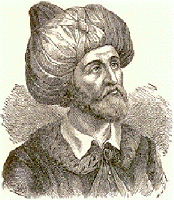July 16: Escape into Religious History
Muhammad's Hegira (622)
It was on this date, July 16, 622, by tradition and on the Western calendar, that Muhammad's hegira (or hijra, هِجْرَة) occurred — that is, his flight from Mecca to Medina (then called Yathrib) in order to escape persecution and found a community of believers. History shows the event taking place in September 622, but Islam fixes the date A.H. 1 – for "in the year of the hegira" – at the first day of the lunar year in which the hegira took place.
Muhammad (محمد) and his followers from Mecca set up a community in the more hospitable Medina, with himself as political and spiritual leader – but for the express purpose of waging war and acquiring booty. Conversions to Islam, most often by threat of the sword, usually followed. This was especially tragic in Muhammad's treatment of the Jews in Medina and elsewhere. Although he borrowed much of Islam from Judaism, and likely from the Palestinian Samaritans, the Jews simply refused to become Muslim. Muhammad slew them by the thousands.
Most of what we know of Muhammad's life, laws, prophecies, and conquests comes from Islamic oral tradition transmitted over the century since his death. Most non-Muslim scholars are highly skeptical of the tales that started tall and acquired details through succeeding generations. For example, there is non-Muslim evidence that early Muslims prayed in the direction of Jerusalem, not Mecca. Seventh-century Muslim coins bear inscriptions differing from the canonical Koranic text. Clearly, there were alterations in the Prophet's story following his death in 632. What is just as clear is that it was conquest and loot, more than religion, that was the engine of Islamic progress across Arabia.
Originally published July 2003 by Ronald Bruce Meyer.


